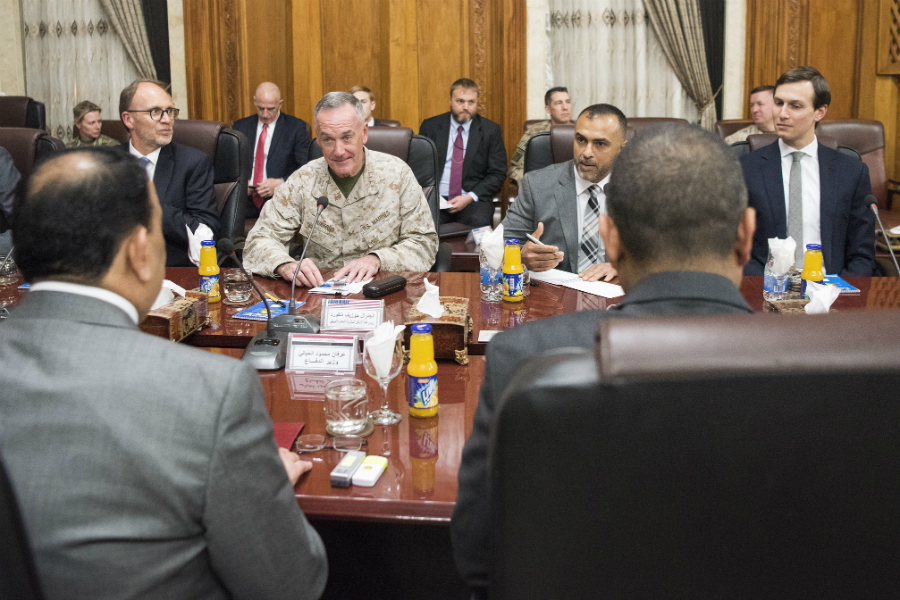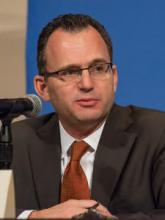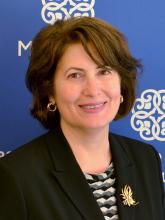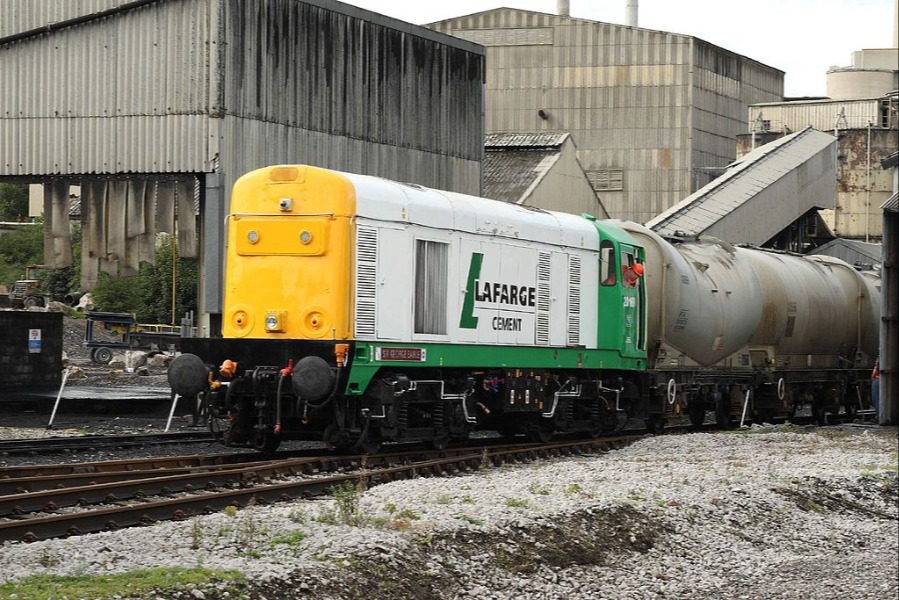The United States Will Need a “Diplomatic Surge” in Iraq
The United States has played a leading role in fighting the Islamic State, but now it must prepare for the fights that will take place at negotiating tables and reconciliation conferences. Iraqis recognize that the coming months will be difficult. In a recent visit to Iraq, our interlocutors from various political stripes emphasized the enormity of the challenges facing the country after the expected expulsion of the Islamic State from Mosul.

Published by The Lawfare Institute
in Cooperation With

The United States has played a leading role in fighting the Islamic State, but now it must prepare for the fights that will take place at negotiating tables and reconciliation conferences. Iraqis recognize that the coming months will be difficult. In a recent visit to Iraq, our interlocutors from various political stripes emphasized the enormity of the challenges facing the country after the expected expulsion of the Islamic State from Mosul. If we are not to make the same mistake of winning the war and again losing the peace, the Trump administration should look beyond the focus on the current battle and develop a layered and sustainable strategy to help Iraq move toward stability. While this strategy will include military and aid components, it will need to have a strong political and diplomatic component. War, including civil war, is the continuation of politics by other means. If Iraq does not get its politics in order, the country’s political struggles will continue to play out in other violent ways that Iraqis have come to know too well, and the specter of more sectarian conflict, radicalization, and terrorism will persist.
First, to be sure, a defeat of the Islamic State in Mosul will not be the end of the kinetic battle against the terrorist organization in Iraq. Though 70 percent of Mosul has been liberated, there are still an estimated 400,000 people behind Islamic State lines in the city. A fair number of these are families of Islamic State fighters who came to Mosul from Diyala, Anbar, and Tikrit. While Iraqi forces have retaken major cities, Islamic State fighters are still entrenched in about 40 percent of Kirkuk province, including the districts of Hawija, Riyadh, and Rashad, which lie on the western side of the province. They also control Tal Afar, parts of Sinjar province, and in Anbar they hold the cities of Ana, Rawa, and Qaim, all close to the border with Syria. Even if defeated there, they could head for the less accessible hills and deserts of Diyala and Anbar provinces, and as long as they also have havens across the border in Syria—most prominently in Raqqa and Deir Ezzor—they can always return. Still, their defeat in Mosul will mean the end of their experiment in religious rule in Iraq and a great blow to their prestige and appeal.
The ongoing kinetic threats justify maintaining a medium-term U.S. military presence around current troop levels of 5,000-6,000 personnel to maintain support, training, and cooperation with the Iraqi armed forces. This is what the Iraqi government has requested, and the United States should provide this assistance. Indeed, President Trump has himself said “we shouldn’t have gone in; but certainly we shouldn’t have left.”
After the liberation of Mosul, Iraq is likely to face a perfect storm of political contests.
Second, humanitarian and stabilization assistance needs will be enormous and urgent. Helping the Iraqi state meet the dire needs of desperate displaced populations and bringing back people, services, and economic life to Mosul is key to Iraq’s path forward. Secretary of State Rex Tillerson made a valid point when he said that the United States is putting up 75 percent of current coalition military effort, but expects other partners to put up much more of the post-fight support. According to senior Iraqi officials, the price tag for rebuilding areas liberated from the Islamic State is estimated to be approximately $50 billion. Iraq will need Washington’s global and regional leverage to marshal the resources to address urgent post-conflict needs.
The third and most critical challenge is political. After the liberation of Mosul, Iraq is likely to face a perfect storm of political contests. Within the majority Shiite community, competition is heating up before the provincial and parliamentary elections set for 2017 and 2018; these contests will determine the identity of the country’s next prime minister and the distribution of power within the next government.
The intra-Shiite competition is gravely complicated by the rise of the Popular Mobilization Units. According to some of our interlocutors, the future role of the PMUs depends partly on what roles PMU leaders want to play in a post-ISIS Iraq and partly on Iran’s future plans for this force. There are serious concerns about whether the PMUs will serve as a moderating factor in Iraq, especially in intra-Shiite politics, or if they will stand as an obstacle to reconciliation and cross-sectarian accommodation.
High tensions between the Kurds and the Baghdad government have been temporarily put aside in favor of winning the war against the Islamic State, but once the battle for Mosul concludes, the profound political differences between Erbil and Baghdad will return to the fore. This includes the fundamental question of whether the Kurds will want to stay within Iraq or declare independence. According to senior Kurdish officials, the question is about when and how they want to exercise their right to self-determination. But even short of that, there will be bitter differences over Kirkuk and parts of the Nineveh plains and Mosul that the Kurdish Peshmerga helped liberate, and renewed disputes over oil and gas rights and revenues. We are already seeing a preview of these contests in Kirkuk, where the provincial council voted on April 4 to hold a referendum regarding the annexation of the city to the Kurdistan Regional Government (KRG). In our recent visit, it was clear that while military cooperation between the Kurdish Peshmerga and government forces was significant, the level of political trust between Erbil and Baghdad was alarmingly low.
The Arab Sunni community is in the direst straits. Its towns and cities have been doubly devastated by the depredations of the Islamic State and the destruction of the battles to dislodge it. Many Sunnis are now displaced and vulnerable, and the community lacks any coherent political leadership.
U.S. officials should engage with Iraqis to work out what form a future sustainable Iraq will take and to help them put it in place.
The United States cannot afford to walk away. If Iraq fails to find a path toward political stability, the conditions for a resurgence of the Islamic State, or any other terrorist group with a new brand, will remain ripe. U.S. officials should engage with Iraqis to work out what form a future sustainable Iraq will take and to help them put it in place. That will require funding; plans to slash the State Department budget, and with it the staffing of U.S. embassies in Iraq and the region, should be reconsidered. While military cooperation will have to continue, what will be needed is not a military but a diplomatic surge. This does not mean more diplomats, but a greater prioritization of purposeful political and diplomatic engagement.
While the challenges are great, there are a number of factors that indicate a political way forward.
First, the collective and so-far successful fight against the Islamic State has created battlefield cooperation and a sense of common purpose and national achievement among disparate and usually divided groups—most importantly, between the Kurdish Peshmerga and the Baghdad-based Iraqi military. This is positive momentum that can be leveraged.
Second, Prime Minister Haider al-Abadi is not his predecessor, Nouri al-Maliki, who alienated many Sunnis and Kurds. Instead, Abadi is a pragmatist and nationalist who understands well the necessity of bringing Iraq’s Arab Sunnis into the new order and finding a negotiated way forward with the Kurds.
Third, the Shia political class—minus Maliki—has grown more pragmatic, realizing that they committed mistakes in their dealings with Sunni compatriots post-2003. Shiite leaders have made two proposals for national reconciliation with their Sunni co-religionists: A "historical settlement" proposal is offered by Ammar al-Hakim, head of the Citizen coalition within the Shiite National Alliance, the largest Shiite bloc, and a contending proposal by the Shiite cleric Muqtada al-Sadr, which calls among other things for social reconciliation and integrating the PMUs into the National Forces. Both leaders call for the United Nations to play a convening and mediating role in a national reconciliation process.
Maliki could be a potential spoiler for this nascent amity. He favors greater Iranian involvement in Iraq and is busy trying to put together a majority coalition, including the PMU leadership, to regain the premiership. If he is successful, it will be the end to all ongoing efforts at Sunni-Shiite reconciliation.
Fourth, the Sunni community is also showing signs of pragmatism. Part of this stems from the recognition that they have been most recently abused and displaced not by the Americans or the Shia, but by their own co-religionists. Provincial elections might bring some new leaders to the fore, particularly some of the provincial governors who are at the forefront of delivering services and have been working with the government in Baghdad to rally Sunni participation in the fight against the Islamic State and the reclamation of Sunni towns and cities.
Fifth, the Arab region is showing new willingness to work with Iraq and Prime Minsiter Abadi. In February, Adel al-Jubeir was the first Saudi foreign minister to visit Baghdad since 1990, and King Salman met with Abadi at the recent Arab Summit in Amman. Saudi Arabia has forgiven Iraq’s debts and announced the resumption of Riyadh-Baghdad flights. Egyptian President Abdel Fattah el-Sisi has also strongly urged closer cooperation with and support for the Iraqi state.
We should not push the Kurds to stay in Iraq if they are committed to leaving.
The United States has been a key player in helping Iraq defeat the Islamic State. But that defeat will not be complete or sustainable unless it can help Iraq build on its security achievements and create a more viable political future. We should work with the Baghdad government to consolidate its victories against the Islamic State and to marshal the resources to address immediate humanitarian and stabilization assistance needs. But we should also work with all parties to revive political dialogue toward reaching a common understanding of the way forward.
We should not push the Kurds to stay in Iraq if they are committed to leaving. Their constant hedging has hurt them and their relations with Baghdad for too long. If they are set on independence, that should not be achieved unilaterally but in an orderly and negotiated process with Baghdad; if they want to stay, Baghdad and Erbil have to agree on fair and enforceable arrangements. The United States should convene a trilateral Washington-Baghdad-Erbil dialogue to design and agree on a roadmap to address the contested issues between Baghdad and Erbil—and the terms of an "amicable divorce" if that is what the parties want.
We should find ways to help the Sunni community rebuild and reconstitute itself after the recent wave of devastation. And we should be making the case to our Sunni partners in the region that they should offer post-conflict aid and encourage Iraq’s Sunnis to reintegrate into the Iraqi state. Whether the Sunni reintegration will include federal or just decentralized arrangements can be agreed in political talks.
The upcoming provincial and parliamentary elections could be an opportunity to consolidate a new political order or an occasion for renewed conflict. We should do all we can to build on the momentum of the recent achievements of the war against the Islamic State to help Iraqis come to a common understanding about the way forward.
And for those whose main concern is rolling back Iranian influence in Iraq, the best way to reduce Iranian leverage is to stand up the Iraqi state.
There will need to be clear political leadership from the White House. While President Trump has dispatched Jared Kushner to Iraq, it might require more of the president’s, or vice president’s, direct engagement down the road. The national security team is doing an excellent job in waging the kinetic war against the Islamic State, and their skills will still be needed after the battle for Mosul. But the greatest challenge after the fighting winds down will be moving the political ball forward, and for that, the skill set of U.S. diplomats at the State Department, and Rex Tillerson’s own high-level engagement, will be urgently needed. Generals can win the war, but only diplomats can secure the peace.






